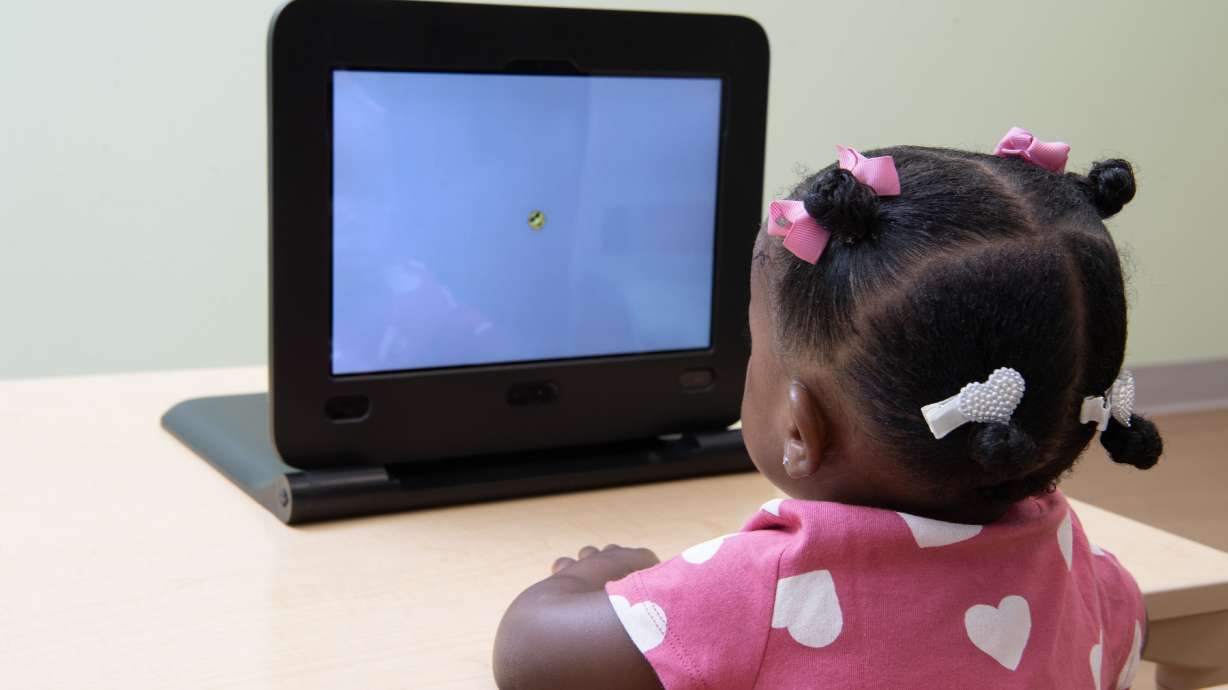Estimated read time: 5-6 minutes
This archived news story is available only for your personal, non-commercial use. Information in the story may be outdated or superseded by additional information. Reading or replaying the story in its archived form does not constitute a republication of the story.
SALT LAKE CITY — Autism is typically diagnosed in children when they are 4 or 5 years old, but a new tool could make earlier detection and intervention possible.
That's according to findings of a phase 3 clinical trial just published in the Journal of the American Medical Association and a feasibility study published at the same time in JAMA Network Open. The studies said that the EarliPoint Evaluation, a digital tool that uses eye-tracking, can diagnose and assess autism in children as young as 16 to 30 months old.
"The demand for earlier and accessible autism diagnosis and objective assessment measures is great," said Sreeni Narayanan, chief technology officer of EarliTec Diagnostics, which makes the device, in a written statement. He added the tool can "objectively measure each child's strength and vulnerabilities, which is critical to inform individual care ... and allows providers to successfully see the work through the eyes of the child and quantify their behavior."
Roughly 1 in 36 children is on the autism spectrum, according to the Centers for Disease Control and Prevention. Though many parents think they see signs of the disorder before a child is 18 months old, the median age for diagnosis is between 4 and 5 years old.
Children are typically diagnosed based on a clinician's evaluation that considers their developmental progress, how they present in the clinic and their parents' reports of overall behavior, CNN reported. "Evaluations can take hours and some subtle behaviors associated with autism may be missed, especially among younger children," the article said.
"Typically, the way we diagnose autism is by rating our impressions," Whitney Guthrie, a clinical psychologist and scientist at the Children's Hospital of Philadelphia's Center for Autism Research who was not part of the studies, told CNN.
She added that what families and autism specialists observe will continue to inform diagnosis, but noted that families can consider and explain children's behaviors differently, so that's not a uniform aid to diagnosis.
"Some of these new technologies are more objective. They don't rely on humans who are imperfect by nature," she said. "They're also potentially more scalable and feasible."
'An objective biomarker'
The clinical study, led by researchers in Atlanta, Georgia, compared the tool's diagnostic success against the "current best practice expert clinical evaluations" at six leading centers for autism diagnosis and treatment, per a news release on the findings.
In the prospective double-blind study published in JAMA, experts at the specialty autism clinics assessed 475 children ages 16 to 30 months old. They found the tool had 71% sensitivity and 80.7% specificity compared to expert clinical diagnosis. In the subgroup where clinicians were positive about the diagnosis (335 children), the sensitivity of the device rose to 78% and the specificity to 85.4%. The researchers said further evaluation of the test's role in early diagnosis and assessment of autism in routine specialty clinic practice "is warranted."
The researchers noted the test was not designed for general population screening.
The feasibility research included two prospective double-blind studies involving 1,089 children ages 16 to 30 months. Of those, 719 were in the discovery study, with 370 in a replication study. The digital assessment tool matched expert clinician diagnosis with 81.9% sensitivity and 89.9% specificity in discovery and 80.6% sensitivity and 82.3% specificity in replication.
The researchers wrote that "these results offer the prospect of an objective biomarker to aid in autism diagnosis and assessment." But they cited limitations, including the small group of expert clinicians and the fact that eye-tracking was done under "well-controlled laboratory conditions," among others, leading them to call for further — and larger — future research.
"These results leverage 15 years of basic science to demonstrate that biomarker-based technologies can provide a solution to the public need for accessible and efficient early diagnosis and assessment of autism," Warren Jones, chief scientific officer and founder of EarliTec and the director of research at Marcus Autism Center, Children's Healthcare of Atlanta, said in the written statement. Jones also teaches at Emory University School of Medicine.
Jones noted the tool is not designed to replace expert clinicians, but rather to aid in assessment and diagnosis. He told Spectrum News that he and his colleagues are studying whether the tool works in population-wide screening, as well as whether it can find autism signs in children as young as 9 months.
Other detection tools
Other researchers are also searching for tools to aid in earlier diagnosis of autism. In January, NBC News reported on a unique test for autism that finds environmental risk markers in a strand of hair, "an innovation that might help clinicians identify (autism) in young children before they miss developmental milestones."
The article said the test, still in early development by startup LinusBio, was accurate in its autism prediction about 81% of the time, based on a study published in the Journal of Clinical Medicine.
Duke University researchers used 45,000 children's electronic health records to come up with an algorithm designed to detect autism early, per USA Today. Infants who later were diagnosed with autism were "much more likely than neurotypical children to have seen an ophthalmologist or neurologist, have stomach or gastrointestinal problems or to receive physical therapy," the article said.
"Infants who will go on to get a diagnosis of autism show very different early patterns of health care utilization," study author Geraldine Dawson, director of the Duke Center for Autism and Brain Development, told USA Today.








